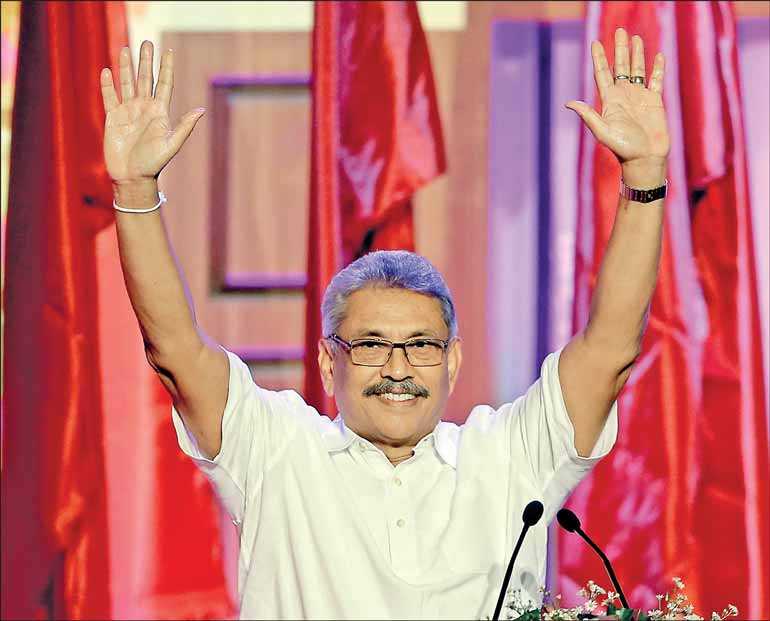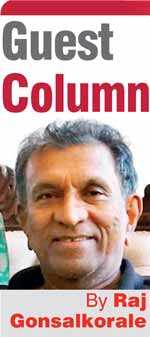Wednesday Feb 25, 2026
Wednesday Feb 25, 2026
Wednesday, 2 October 2019 00:00 - - {{hitsCtrl.values.hits}}

“Who’s Afraid of the Big Bad Wolf?”
Number three said, “Nicks on tricks!
I’ll build my house with bricks!”
He had no chance to sing and dance
’cause work and play don’t mix
Some have portrayed Gotabaya Rajapaksa as the Big Bad Wolf in ‘Who’s Afraid of the Big Bad Wolf?’ – a popular song which was originally featured in the 1933 Disney cartoon ‘Three Little Pigs’ – as they arrogantly believe their houses of straw and twigs will protect them from the Big Bad Wolf. 
The third pig of course was clever and built his house with bricks and thus was safe. From a Sri Lankan contemporary context, that third house represents the law and justice system in Sri Lanka. The country will be safe from anyone and everyone if the law of the land is independently and justly applied to everyone irrespective of who they are, and law enforcement personnel act independently, without fear or favour, and importantly, are allowed to do so.
There may be fears about a return of Gotabaya Rajapaksa to the echelons of power. Although not established or proven, the white vans and misuse of power haunt him and it is something that his opponents will continue to haunt him with.
Whatever fears anyone has about any of the contenders for the presidency, what will guard the country from anyone who may wish to act above the law, is the law itself, its independence, its application without fear or favour and its dispensation of justice. However, it is not the opponents that should concern the general public of the country. It is whether the law will be upheld and applied justly and fairly, and the fundamental norm in law, that accusations are proven beyond any reasonable doubt is upheld when dispensing justice.
Fighting terrorism often results in extra judicial activity as witnessed in many countries in the world today and forever more before. Several countries in the Middle East is testimony to this situation, and invariably, it is the innocent who suffers for no fault of theirs.
The battles against the LTTE had usurped the law of the land and usurpers were plenty then. The LTTE did not adhere to conventions and at times, non-conventional methods were needed to counter terrorism heaped on the country. Lest we forget, those days, more than 10,000 of them over 30 years, were not safe, happy and contented times for the country.
This is why terrorism should not be allowed to raise its head as conventional methods to eradicate it does not work when it comes to fighting terrorism. Unconventional methods give opportunities to the State apparatus as well as non-State apparatus to act outside the law to fight terrorism, and this often has a very serious injurious effect on civil liberties and individual rights.
Those who fear Gotabaya Rajapaksa for his unconventional methods to fight terrorism, although its yet to be proven that he used unconventional methods, should take their minds back to the time of the second uprising of the JVP in the late 1980s, when UNP leaders like J.R. Jayewardene and R. Premadasa, and ministers like Ranjan Wijeratne, used harsh methods which may be regarded as unconventional to put down that uprising. It is said that thousands died during that conflict although hardly anything is mentioned these days about the period of fear.
A senior member of the governments headed by J.R. Jayewardene and R. Premadasa, is today the Prime Minister of the country, and he has held that office on four occasions. It is well to rekindle the memories of Sri Lankans that these three leaders presided over another violent period of the country’s history in 1983 when scores of Tamil people were killed and rendered homeless, with thousands having to flee overseas with their families for their safety.
The country does not need and does not deserve any activity above the law of the land whoever the leader is. However, those in glass houses should not throw stones and pretend their leaders and their parties have been innocent of extra judicial activity, and the killing of thousands of people, mainly the youth of the country, in their unconventional quest to rid the country of JVP “terrorists”.
Sajith Premadasa often refers to his main qualification to be the president of the country as being the son of R. Premadasa, the common man’s president. No doubt R. Premadasa was a common man’s president compared to many of the leaders the country has had since independence. However, R. Premadasa was also known to use unconventional methods to govern, not only to fight terrorism but even to fight his political opponents.
The Asia Week issue of 12 May 1993 quotes a long-time political analyst who gives a graphic account of Premadasa, the enigma, upon his assassination and states: “Despite the political instability, an eerie calm settled over the island. An era was closing. Premadasa presided over one of the most violent periods of the country’s 2,500-year history. In him was the key to understanding everything that was good and evil about contemporary Sri Lanka. Anyone who looked could find equal measures of both in the man. But in the end it was the dark side that won out.”
Premadasa aligning with the LTTE and the JVP to defeat the Indian Peace Keeping Force is recorded history. According to the Asia Week of 12 May 1993, the JVP subsequently murdered hundreds of UNP supporters and over 3,000 civilians, and Premadasa was compelled to unleash unconventional methods to fight his onetime ally against the IPKF. It is said that in in the first week of July 1989 alone, with or without his knowledge, and some say on his orders, over 5,000 people had been tortured and killed and their corpses left in towns throughout the south as a lesson to anyone who was supporting the JVP.
Besides Premadasa’s unconventional methods in dealing with terrorism, he was also a great proponent of a free market economy. He sold off 42 State corporations but his intentions to pass down the benefits through a trickledown theory had not worked and the rich had got richer and the poor had got poorer. Indications are that Premadasa was not a good economic manager.
Sajith Premadasa therefore has to be careful, and chose well, the attributes of his father he claims he represents, as unlike the SLPP challenger Gotabaya Rajapaksa who, by and large, is his own person.
Sajith Premadasa does not have many achievements he could claim as his own, while his father, to his credit, proved his capabilities long before he even became a Member of Parliament, let alone a Minister. The country should consider the legacy he claims as his right as being the son of R. Premadasa, and ask him pointedly what part of that legacy he claims and what part he does not, or whether he claims all of it, the good and the bad, and some say the evil. In this context, no one really knows who Sajith Premadasa is as it is likely even he does not know who he is if the only qualification he claims to be the president of the country is that he is R. Premadasa’ s son.
Some seniors in the UNP have rushed to support Sajith Premadasa because of his populist appeal solely on account of him being the son of another populist leader, forgetting the dark side of that legacy.
If Sajith Premadasa is to be the president of Sri Lanka, he should project his own vision and program for the country and demonstrate he will be his own person and will not be manipulated by anyone. He must also dispel a general feeling amongst some that he is being manipulated by a large business conglomerate which is supposed to be bankrolling his campaign. There is no evidence to this but it will be in his and the country’s interest to dispel any perceptions that such a thing is happening. He must also stop his mantra about his qualification as the voters may assume, rightly or not, that even the dark side of his father’s legacy is also a qualification to be the president.
The latest candidate to join the fray is another former Commander of the Army, Mahesh Senanayake. Unfortunately for the country, the National People’s Movement (NPM) has thought it appropriate to field a former Army Commander to be the presidential candidate. The unfortunate aspect of this decision is the fact that of the three former Army top brass, two are presidential candidates and one is an influential backer of the UNP candidate Sajith Premadasa. Army, and armed forces involvement, mostly indirectly of course, in the Presidential Election and subsequently in the General Election is inevitable now, and this does not augur well for the country.
The NPM surely could have chosen to support another candidate. Instead, they have chosen to support someone who would, in their opinion, be a counter to one candidate, and who would be counter to the support provided to the other candidate purely on account of his own military background. The NPM, which was basing its pitch on being politically different, appears to have become the same as the rest.
The NPM should have selected A.T. Ariyaratne, the patriarch of the Sarvodaya movement. He would have been the ideal candidate to dismantle the executive presidency which virtually every candidate says they wish to dismantle, but none of them actually would take any step to do so.